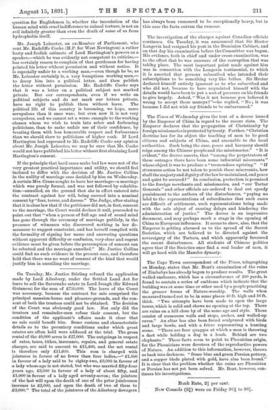The Times of Wednesday gives the text of a decree
issued by the Emperor of China in regard to the recent riots. The Emperor declares that the propagation of Christianity by foreign missionaries is protected by treaty. Further, " C hristian doctrine has for its object the teaching of men to be good citizens and subjects of China, and amenable to the local authorities. Such being the case, peace and harmony should reign among the Chinese people and the missionaries." "It is evident," the decree asserts, that "among the perpetrators of these outrages there have been some influential miscreants" whose object it was to produce a "tremendous uprising." "If strenuous action be not taken to punish these miscreants, how shall the majesty and dignity of the law be maintained, and peace and quiet be secured?" In conclusion, protection is promised to the foreign merchants and missionaries, and "our Tartar Generals" and other officials are ordered to deal out speedy punishment to the authors of the disturbances, "paying no heed to the representations of subordinates that such cases are difficult of settlement, such representations being made with the sole object of causing delays and hindering the administration of justice." The decree is an impressive document, and may perhaps mark a stage in the opening of China to European influences. It seems to show, also, that the Emperor is getting alarmed as to the spread of the Secret Societies, which are believed to be directed against the sovereignty of the Tartars, and which apparently favoured the recent disturbances. All students of Chinese politics agree that if the Societies once find a real leader of men, it will go hard with the Manchu dynasty.


































 Previous page
Previous page